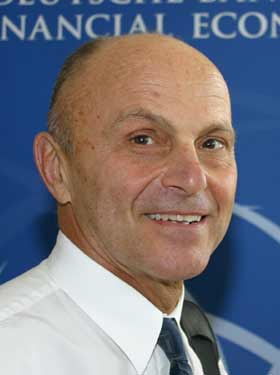Every quarter, 45 days after the end of the quarter, big institutional money managers are required to disclose the stocks they bought or sold during the quarter.
This is the so-called “smart money” laying out their cards.
We can peek over the shoulders of some of the greatest investors in history to see what the smart money is buying.
Just don’t follow these picks blindly.

Caveats
The 13-F reports provided to the SEC are a snapshot in time. There is no guarantee that the manager still owns the stock by the time we read the report.
We also have no information about short positions or futures positions. So, in reading the raw reports, we have no way of knowing if a manager is truly bullish on a particular stock … or if that stock is simply a piece of larger hedge or pair trade.
But if you’re familiar with the trading styles of the managers you follow (and I am), you can get a pretty good idea of what their intentions are.
Apple (AAPL)
Buying: Warren Buffett
Selling: David Einhorn, Steve Cohen, Leon Cooperman, Jim Chanos
I’ll start with iPhone maker Apple Inc., which has become something of a punching bag for hedge fund titans.
As Apple has struggled to grow in recent years, several big money investors have lost patience and moved on. Greenlight Capital’s David Einhorn sold 1.3 million shares last quarter, reducing his total by nearly 17%.
Apple remains his largest single holding, however, at 12% of his portfolio. Steve Cohen, Leon Cooperman and Jim Chanos also reduced their positions in Apple.
But interestingly, one very high-profile investor — Mr. Warren Buffett himself — made a large Apple purchase. Buffett raised his stake in AAPL by more than 50%.
Apple still remains a small position for Berkshire Hathaway Inc. (BRK/B) at about 1% of the portfolio. But Buffett clearly likes what he sees, and his stake is growing.
I, for one, agree with Buffett here. Apple’s slow growth is mostly a result of impossible-to-top comps due to the unprecedented success of the iPhone 6. But as Apple’s sales cycle gets back to normal, you should see very steady growth in the years ahead.
And as I wrote recently, yes, Apple’s cash hoard really is a sight to behold.
General Motors (GM)
Buying: David Einhorn
Staying: Mohnish Pabrai
Selling: David Tepper
Speaking of David Einhorn, Greenlight Capital also poured a lot more money into General Motors Company. Einhorn picked up an additional 1.9 million shares, which boosts his total by about 13%.
General Motors is his second-largest holding after Apple and makes up about 9% of his long portfolio.
Interestingly, Einhorn is mostly alone in this trade.
David Tepper has been unloading his formerly large position for the past year, and there aren’t too many large managers that have meaningful positions in the stock.
But it is worth noting that Mohnish Pabrai — a well-respected value manager known for making concentrated bets — has 21% of his portfolio invested in GM warrants.
My bet is that Einhorn and Pabrai are rewarded for their independence here. General Motors is a steal at under $32 per share. At that price, the stock trades for an almost insulting 5 times earnings.
Yes, GM’s earnings are highly cyclical, so you have to take the price-to-earnings ratio with a grain of salt. But I expect demand to be above average for several years to come, as sales were exceptionally low for years after the 2008 meltdown and have only recently started to recover.
AerCap Holdings (AER)
Buying: David Einhorn, Mohnish Pabrai
Whenever I see a stock appear in the portfolios of multiple investors I respect, I get excited … particularly if it is a smaller company I’d never previously heard of.
That’s exactly what we have today in AerCap Holdings NV, an Irish aircraft leasing company. AerCap engages in the leasing, financing, sale and management of commercial aircraft and engines principally in China, the Netherlands and the United States.
Think of AerCap as a middleman for commercial aircraft.
Two investors I’ve already mentioned — David Einhorn and Mohnish Pabrai — recently took large positions in the company.
Pabrai initiated a new position in the company that, as of quarter end, already made up 7% of his portfolio. Einhorn has been slowly building a position since 2014, but he upped it by a substantial 26% last quarter. AerCap also makes up about 7% of Einhorn’s portfolio.
AerCap stock hasn’t done a lot of late. Its stock price has bounced around in a range of about $25 to about $50 since 2014. But AER does trade at a modest 7.6 times earnings and 0.9 times book value.
Facebook (FB)
Buying: Daniel Loeb
No CEO ever wants to get a letter from Third Point’s Daniel Loeb. Loeb is known for writing scathing letters to management teams that he sees as being in need of improvement … and then publicly posting the letters in an act of shaming.
Loeb is the quintessential activist investor. He likes to shake up companies to unlock value. So once you’re in his crosshairs, look out. You might not have that sweet C-suite gig much longer.
Interestingly, Loeb’s biggest recent addition — social media leader Facebook— is about as close to immune from shareholder activism as you can get.
Founder Mark Zuckerberg holds a majority interest in the company via his Class B super-voting shares, and his control of the company is so complete, he reserves the right to appoint his own successor upon his death.
Facebook makes up about 4% of Loeb’s long portfolio, making it his fourth-largest pick. Given that he realistically has no ability to shape Facebook as an activist, we’re left to conclude that he simply likes the stock and considers it a good value.
Allergan (AGN)
Buying: Carl Icahn, Seth Klarman
Selling: David Einhorn, John Paulson, Jeremy Grantham, Steve Mandel, Andreas Halvorsen
No smart money list is complete without the obligatory mention of veteran Carl Icahn. And Mr. Icahn didn’t disappoint last quarter, adding a large new position in pharma giant Allergan plc.
Icahn Capital Management bought 3.4 million shares last quarter, making Allergan its 10th largest holding at just shy of 4% of the portfolio.
He joins value investing demigod Seth Klarman, who added to his large position last quarter. After picking up another 280,000 shares, Allergan makes up about 6% of Klarman’s portfolio.
Interestingly, not all of the “masters of the universe” share Icahn’s enthusiasm.
David Einhorn completely sold out of his position, as did Jeremy Grantham and Steve Mandel. And John Paulson and Andreas Halvorsen made significant reductions. So Allergan, like Apple, has become something of a battleground stock among hedge fund investors.
Only time will tell whether the bulls or bears are ultimately correct, in my opinion. Allergan isn’t exceptionally cheap, trading at 25 times earnings and 6 times sales. But I would be reluctant to bet against Icahn and Klarman.
Citigroup (C)
Buying: Seth Klarman
And speaking of Seth Klarman, Allergan wasn’t his only new addition last quarter. Klarman also started a new position in Citigroup Inc. Klarman’s Baupost Group picked up 5.2 million shares, making Citi its eighth largest holding.
Klarman is known for having a nose for value … and for his almost superhuman ability to suppress his emotions and buy stocks that no one else is buying. So I take his portfolio moves very seriously.
He’s moving into a major U.S. banking stock at a time when most investors are reluctant to touch them. The conventional wisdom is that, because the Federal Reserve will not be raising rates as aggressively as previously thought, banks will have to slog along for longer in a low-interest-rate environment that crimps profitability.
While that is likely to be the case, in my view there is a price at which all the bad news is already priced in. And given that Citi trades at just 0.62 times book value, it looks like Klarman believes we’ve hit that point, in my opinion.
Energy Transfer Equity (ETE)
Buying: David Dreman
David Dreman has had a fantastic career as a small-cap value manager. Unlike a lot of the other gurus I’ve highlighted, he tends to take more modest-sized positions.
That makes sense, as he’s a traditional mutual fund manager and not a gun-slinging hedgie.
I was delighted to see that Dreman added one of my very favorite stocks last quarter, Energy Transfer Equity LP.
I liked Energy Transfer enough to make it my pick in InvestorPlace’s Best Stocks for 2016 contest, and as of this writing, I’m in second place with a year-to-date return of nearly 40%.
Energy Transfer Equity was beaten, battered and left for dead earlier this year … at one point down more than 70% on the year. So it’s no surprise to me that contrarian value investor like Dreman would be picking up shares.
While ETE took some reputation risk in its botched attempt to acquire rival Williams Companies Inc (WMB), the company sits at the top of a profitable pipeline empire.
And while I expect dividend growth to be modest for a couple years as ETE reduces its debt load, it’s worth noting that Energy Transfer Equity has raised its dividend at a rate of more than 50% annually over the past three years.
Charles Sizemore is the principal of Sizemore Capital Management, a registered investment adviser in Dallas, Texas. As of this writing, he was long AAPL, ETE and GM.
This article first appeared on InvestorPlace.com
Photo Credit: sabin paul croce via Flickr Creative Commons




